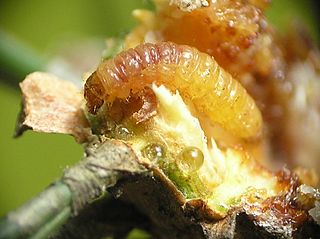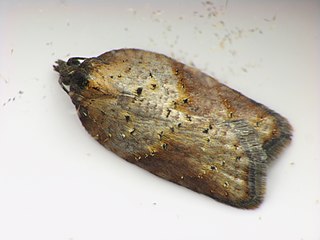
The Archipini are a tribe of tortrix moths. Since many genera of these are not yet assigned to tribes, the genus list presented here is provisional.

Zeiraphera isertana is a moth of the family Tortricidae. It is found in China, Russia, Europe and the Near East.

Spilonota ocellana, the bud moth, is a moth of the family Tortricidae. It is found in the Palearctic realm, from North Africa and Europe to Iran, eastern Russia, China, Korea, and Japan. It is also present on Madeira and in North America.
Leguminivora is a genus of moths belonging to the subfamily Olethreutinae of the family Tortricidae.

Cochylis is a genus of moths belonging to the subfamily Tortricinae of the family Tortricidae.

Phalonidia is a genus of moths belonging to the subfamily Tortricinae of the family Tortricidae.

Phalonidia contractana is a moth of the family Tortricidae. It is found in southern Europe, Dalmatia, Macedonia, Hungary, Romania, Bulgaria, Greece, Ukraine, southern Russia (Sarepta), Uralsk, Turkey, Kuldscha, Afghanistan, Kashmir, Lebanon, China, Iran, Pakistan and Kyrgyzstan.

Gravitarmata margarotana, the pine cone tortrix or pine twig moth, is a moth of the family Tortricidae. In Europe, it is found from England to Austria and Poland, east to the Baltic region to Russia, China, Korea and Japan.

Retinia resinella, the pine resin-gall moth, is a moth of the family Tortricidae.

Notocelia cynosbatella is a moth of the family Tortricidae. It is found from Europe to eastern Russia, it is also found in Asia Minor, Iran, Kazakhstan, China and Mongolia.

Rhopobota naevana, the holly tortrix moth, holly leaf tier or blackheaded fireworm, is a moth of the family Tortricidae. It is found from Europe to eastern Russia, China, Taiwan, Mongolia, Korea and Japan. It is also present in India, Sri Lanka and North America.

Rhyacionia duplana, the summer shoot moth or Elgin shoot moth when referring to subspecies logaea, is a moth of the family Tortricidae. It is found from northern and central Europe to eastern Russia, China and Japan. It has also been reported from Korea, but it has not been found in recent studies.

Rhyacionia pinicolana is a moth of the family Tortricidae. It is found from northern and central Europe to eastern Russia, China, Japan and Korea.

Rhyacionia pinivorana, the spotted shoot moth, is a moth of the family Tortricidae. It is found from northern and central Europe to eastern Russia, China, Korea and Japan.

Zeiraphera ratzeburgiana, the spruce bud moth or Ratzeburg tortricid, is a moth of the family Tortricidae. It is found from northern and central Europe to eastern Russia and China. Zeiraphera ratzeburgiana is a taxonomically similar species to Zeiraphera canadensis and can only be distinguished by an anal comb found in Z. canadensis.

The Tortricini are a tribe of tortrix moths.

Acleris hastiana is a moth of the family Tortricidae. It is found in Europe, northern Iran, Kazakhstan, Ala Tau, central Siberia, Irkutsk, the Amur region and China. In North America it is found from the north-eastern United States across southern Canada to British Columbia and south along the Pacific Coast to California.

Acleris ferrugana is a species of moth of the family Tortricidae. It is found in China, most of Europe and has also been recorded from North America.

Cochylis posterana is a moth of the family Tortricidae. It is found in Europe, Iran and China.

Phalonidia curvistrigana, the golden-rod conch, is a species of moth of the family Tortricidae. It is found in China, Japan, Korea, Russia and most of Europe. The habitat consists of woodland and scrubland.


















